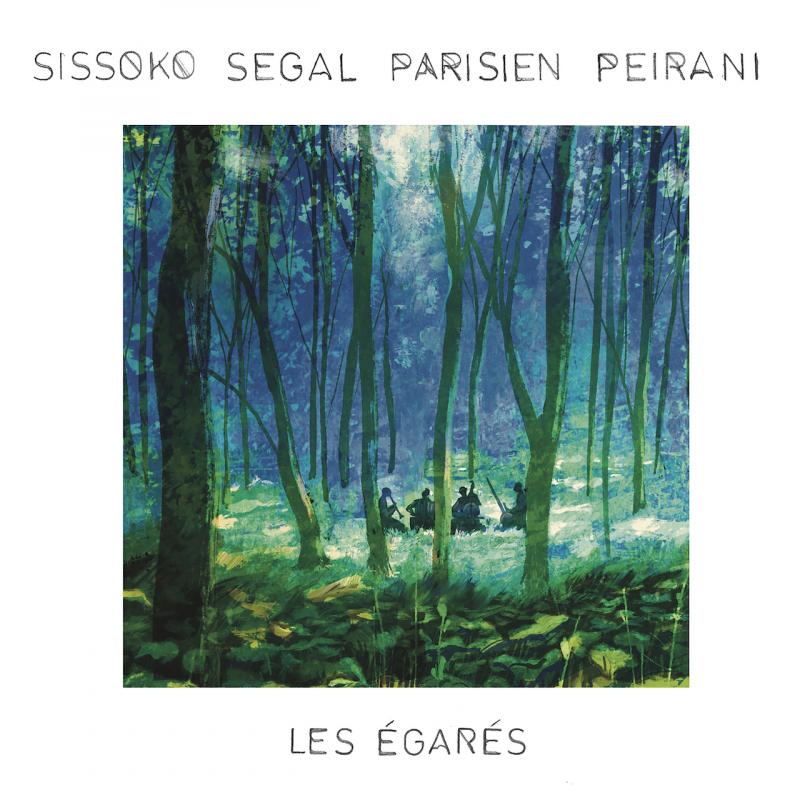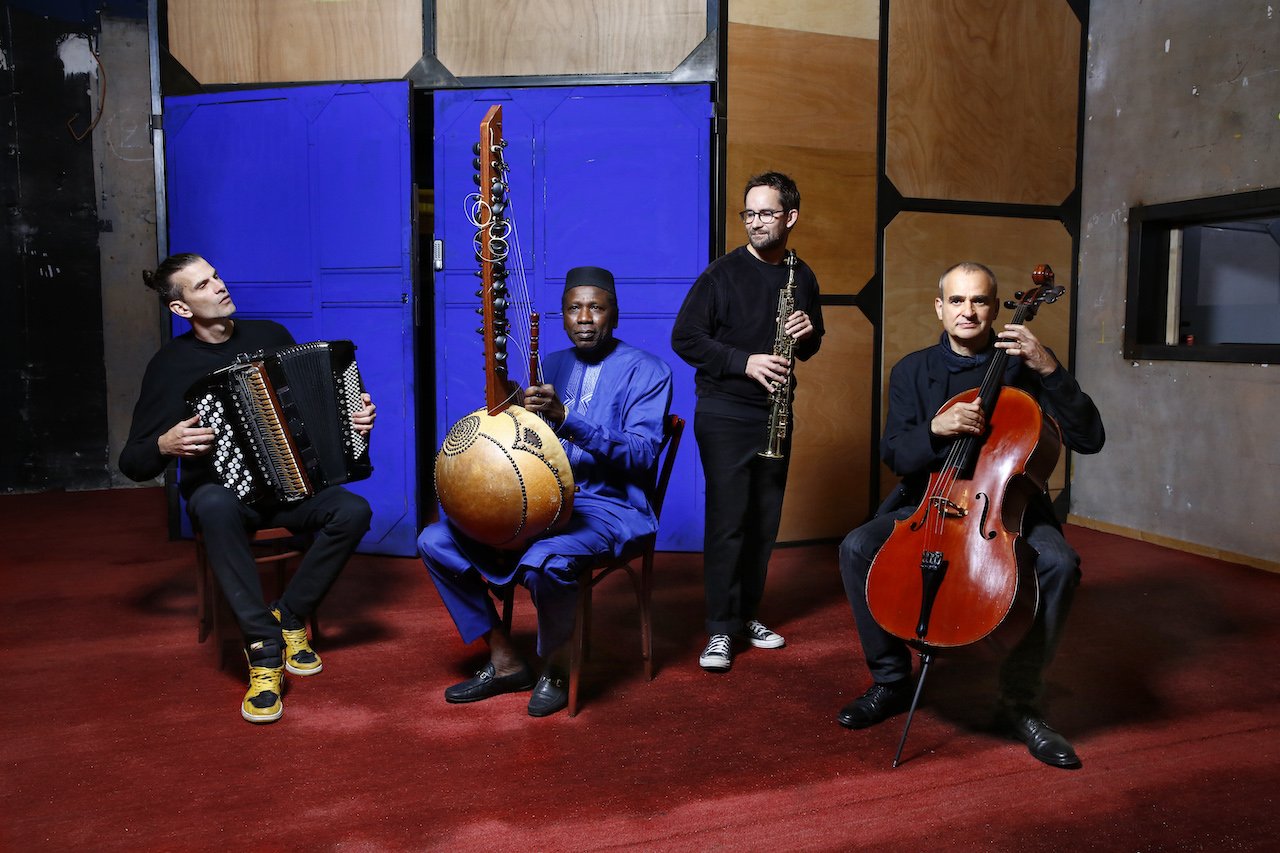Album: Sissoko Ségal Parisien Peirani - Les Égarés | reviews, news & interviews
Album: Sissoko Ségal Parisien Peirani - Les Égarés
Album: Sissoko Ségal Parisien Peirani - Les Égarés
Delicate musical conversations hit the spot

This is an enchanting album which brings together four outstanding musicians, brilliant in their own right, but also adept at the kind of collaboration in which the whole is greater than the sum of the parts.
The distinguished cellist Vincent Ségal – with roots as varied as can be imagined – has known how to bring out the excellent musicianship of the Malian kora-player Ballaké Sissoko, in a series of beautiful albums for the adventurous French label No Format, which has once again brought the two perfectly matched players together. They are joined by accordionist Vincent Peirani and saxophonist Émile Parisien, both much-admired jazz players who take delight in a fluid kind of boundary-breaking that never feels forced.
The joy the quartet (pictured below) derives from coming together is palpable. Each track features a conversation that showcases individual talent, and exploits the differences as well as the similarities in tone, phrasing and emotion. With the gentle cascade of notes that pour from the kora, an instrument that summons serenity like no other, there is no option but to favour intimacy, modesty and attunement. The way in which each of the four men listens to the others, and responds is remarkable. It’s almost as if they were making love to each other musically – or dancing. The delicacy of Peirani’s accordeon is bewitching, far from the clichés of French musette, and yet faithful to the instrument's tonal character. In the first section of “Izao”, accordeon and kora dialogue with the utmost sensitivity, transforming the contrasts into a delicate complicity. Parisien – with a cool and breathy tone – weaves beautiful melodies, mostly on a soprano sax that comes close to sounding like a flute. On “Orient Express”, Ségal who’s familiar with the Istanbul and Smyrna lyra players who graced the classic recordings of Rosa Eskenazi and Rita Abadzi, draws subtles microtones out of his cello, expressing a melancholy that’s both joyful and sad.
The delicacy of Peirani’s accordeon is bewitching, far from the clichés of French musette, and yet faithful to the instrument's tonal character. In the first section of “Izao”, accordeon and kora dialogue with the utmost sensitivity, transforming the contrasts into a delicate complicity. Parisien – with a cool and breathy tone – weaves beautiful melodies, mostly on a soprano sax that comes close to sounding like a flute. On “Orient Express”, Ségal who’s familiar with the Istanbul and Smyrna lyra players who graced the classic recordings of Rosa Eskenazi and Rita Abadzi, draws subtles microtones out of his cello, expressing a melancholy that’s both joyful and sad.
Although each of the four musicians is a star, there's none of the brio that one might expect from a supergroup. And yet, this is, in every way, an album that resounds with instrumentalists at the top of their game, distinguishing themselves through fine and articulate attunement, and a shared pleasure that is a wonder to behold. The album’s title track “Les égarés” refers to those who have lost their way. That loss isn’t, however, a lack of direction, but a refusal to walk the well-worn path of cliché and a delight in being open at every moment to new horizons.
rating
Explore topics
Share this article
The future of Arts Journalism
You can stop theartsdesk.com closing!
We urgently need financing to survive. Our fundraising drive has thus far raised £49,000 but we need to reach £100,000 or we will be forced to close. Please contribute here: https://gofund.me/c3f6033d
And if you can forward this information to anyone who might assist, we’d be grateful.

Subscribe to theartsdesk.com
Thank you for continuing to read our work on theartsdesk.com. For unlimited access to every article in its entirety, including our archive of more than 15,000 pieces, we're asking for £5 per month or £40 per year. We feel it's a very good deal, and hope you do too.
To take a subscription now simply click here.
And if you're looking for that extra gift for a friend or family member, why not treat them to a theartsdesk.com gift subscription?
more New music
 Slovenian avant-folk outfit Širom’s 'In the Wind of Night, Hard-Fallen Incantations Whisper' opens the door to inner space
Unconventional folk-based music which sounds like nothing else
Slovenian avant-folk outfit Širom’s 'In the Wind of Night, Hard-Fallen Incantations Whisper' opens the door to inner space
Unconventional folk-based music which sounds like nothing else
 'The Art of Loving': Olivia Dean's vulnerable and intimate second album
Neo soul Londoner's new release outgrows her debut
'The Art of Loving': Olivia Dean's vulnerable and intimate second album
Neo soul Londoner's new release outgrows her debut
 Music Reissues Weekly: The Peanut Butter Conspiracy - The Most Up Till Now
Definitive box-set celebration of the Sixties California hippie-pop band
Music Reissues Weekly: The Peanut Butter Conspiracy - The Most Up Till Now
Definitive box-set celebration of the Sixties California hippie-pop band
 Doja Cat's 'Vie' starts well but soon tails off
While it contains a few goodies, much of the US star's latest album lacks oomph
Doja Cat's 'Vie' starts well but soon tails off
While it contains a few goodies, much of the US star's latest album lacks oomph
 Mariah Carey is still 'Here for It All' after an eight-year break
Schmaltz aplenty but also stunning musicianship from the enduring diva
Mariah Carey is still 'Here for It All' after an eight-year break
Schmaltz aplenty but also stunning musicianship from the enduring diva
 Album: Solar Eyes - Live Freaky! Die Freaky!
Psychedelic indie dance music with a twinkle in its eye
Album: Solar Eyes - Live Freaky! Die Freaky!
Psychedelic indie dance music with a twinkle in its eye
 Album: Night Tapes - portals//polarities
Estonian-voiced, London-based electro-popsters' debut album marks them as one to watch for
Album: Night Tapes - portals//polarities
Estonian-voiced, London-based electro-popsters' debut album marks them as one to watch for
 Album: Mulatu Astatke - Mulatu Plays Mulatu
An album full of life, coinciding with a 'farewell tour'
Album: Mulatu Astatke - Mulatu Plays Mulatu
An album full of life, coinciding with a 'farewell tour'
 Music Reissues Weekly: Sly and the Family Stone - The First Family: Live At Winchester Cathedral 1967
Must-have, first-ever release of the earliest document of the legendary soul outfit
Music Reissues Weekly: Sly and the Family Stone - The First Family: Live At Winchester Cathedral 1967
Must-have, first-ever release of the earliest document of the legendary soul outfit
 Album: Robert Plant - Saving Grace
Mellow delight from former Zep lead
Album: Robert Plant - Saving Grace
Mellow delight from former Zep lead
 Brìghde Chaimbeul, Round Chapel review - enchantment in East London
Inscrutable purveyor of experimental Celtic music summons creepiness and intensity
Brìghde Chaimbeul, Round Chapel review - enchantment in East London
Inscrutable purveyor of experimental Celtic music summons creepiness and intensity
 Album: NewDad - Altar
The hard-gigging trio yearns for old Ireland – and blasts music biz exploitation
Album: NewDad - Altar
The hard-gigging trio yearns for old Ireland – and blasts music biz exploitation

Add comment